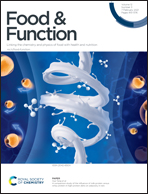Effect of the protein hydrolysate of rice syrup meal on the endurance exercise performance of BALB/c mice†
Abstract
Rice is a staple food in Korea. The protein in rice reportedly contains higher levels of branched-chain amino acids (BCAAs) than proteins in other grains. Taking BCAAs during exercise can reduce muscle fatigue by reducing muscle glycogen depletion. However, there are limited studies reporting the anti-fatigue effect of rice protein. We investigate the muscular endurance and anti-fatigue effects of the protein hydrolysate of rice syrup meal in mouse models. BALB/C mice were divided into the following groups: control (CON), low and high dose rice syrup meal (RL: 1.5 g kg−1; RH: 3.0 g kg−1), and low and high dose protein hydrolysate of rice syrup meal (PL: 1.5 g kg−1; PH: 3.0 g kg−1). The total activity during a forced swimming test was analyzed by a behavioral assay. The mutual relationship between the anti-fatigue activity and energy metabolism was assessed by biochemical, enzyme activity, and gene expression analyses. The protein hydrolysate of rice syrup meal contained 32.18 mg g−1 BCAAs, such as leucine, isoleucine, and valine, and its BCAA ratio (2.5 : 1.0 : 1.4) was considered effective for endurance exercise. Furthermore, PH administration significantly increased the change in the maximum swimming duration by 4.2 min (3.77 ± 0.74 min) compared to that of the CON group (−0.42 ± 0.55 min, p < 0.01). The PH group showed significantly different changes in the blood glucose and lactate levels compared with the CON group; similarly, the aspartate amino transferase and alanine amino transferase levels were significantly lower in the protein hydrolysate of rice syrup meal group than the CON group (p < 0.001 and p < 0.01, respectively). The protein hydrolysate of rice syrup meal-mediated improvement of endurance performance was accompanied by an increased in adenosine triphosphate content in the muscle and decreased reactive oxygen species accumulation in the liver. In addition, mRNA and protein levels of phospho-AMP activated protein kinase (p-AMPK)/AMPK and peroxisome proliferator-activated receptor gamma coactivator 1-alpha (PGC1-α), the major energy-related factors of protein hydrolysate of rice syrup meal, were significantly increased. The protein hydrolysate of rice syrup meal can be utilized as an efficacious natural resource for its muscular-endurance-enhancing and anti-fatigue effects.



 Please wait while we load your content...
Please wait while we load your content...